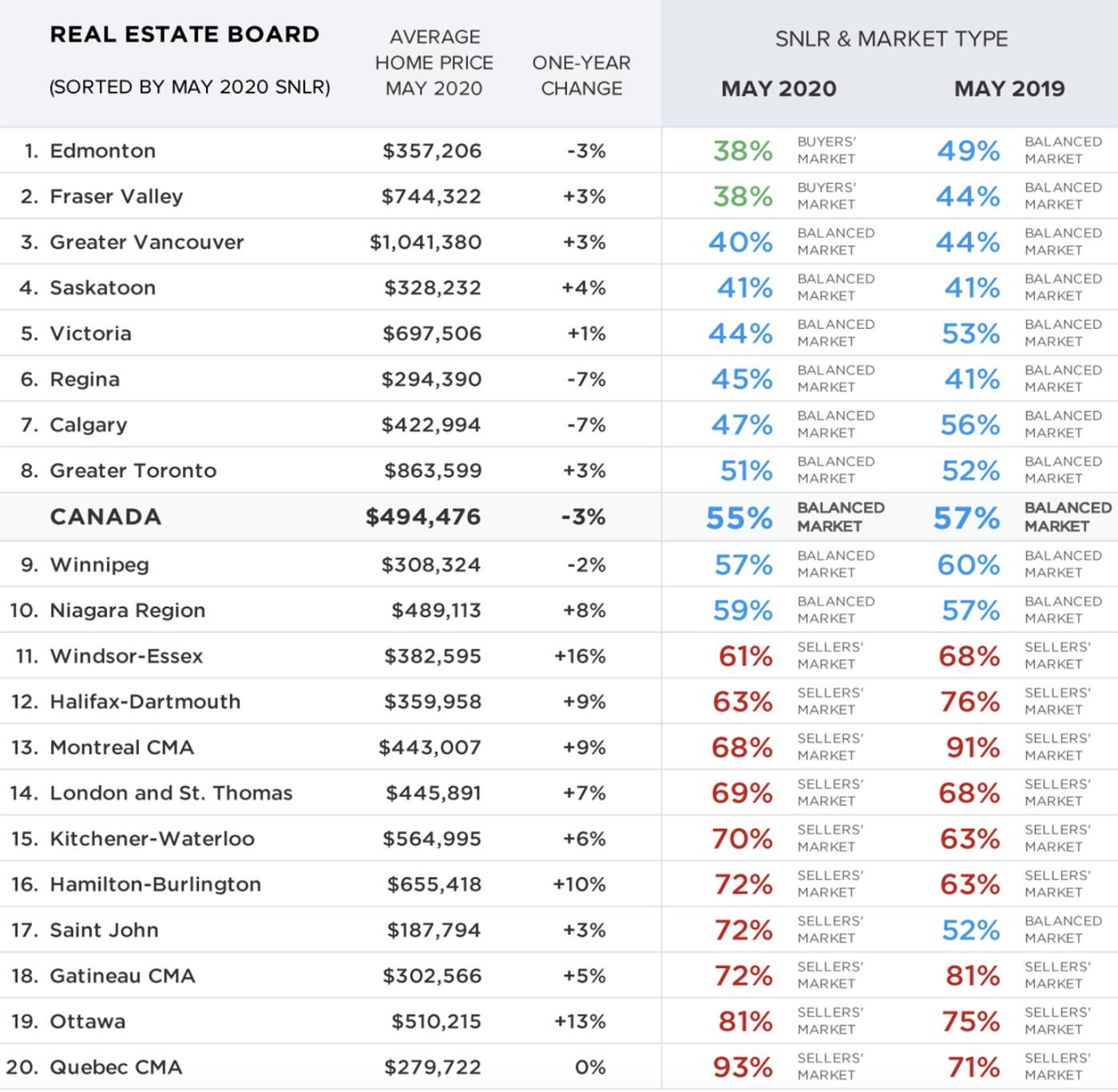
This is the state of the real estate market in cities across Canada
The real estate market in Toronto, Ottawa, Vancouver and other cities in Canada has shifted in the wake of the economic impacts from the global pandemic.
Many would-be homeowners have been keeping an eye on local real estate markets, hoping for a drop in prices in notoriously expensive cities.
Though the industry did certainly take a hit due to the health crisis, it seems that things are back on the rise in some parts of the country yet again, despite forecasts that the market wouldn't recover for years.
And, according to data from Zoocasa based on Canadian Real Estate Association numbers, even though the volume and price point of home sales for May were around 40 per cent lower than they were the same time last year, competition for real estate is still pretty fierce.
The CREA states in its monthly report that as far as the ratio between sales and new listings (SNLR) — a number that indicates the robustness of a market and whether it favours buyers or sellers at any given time — "remarkably little changed considering the extent to which current economic and social conditions are impacting both [sides]."
REPORT: Despite a significant drop in sales volume, housing competition conditions remain similar to last year in several markets across Canada. Find out which markets favour buyers and where sellers have better leverage:https://t.co/o8QKTIyk7a pic.twitter.com/bXpco2ivq0
— Zoocasa (@zoocasa) June 18, 2020
When looking at Canada as a whole, the proportion of new home listings to actual home sales sat around 55 per cent in May 2020, compared to 57 per cent in May 2019. This indicates a pretty balanced market for both buyers and sellers, close to the midline.
And, the average home price was only three per cent lower last month than it was at the same time last year, landing at $494,476.
When these numbers are analyzed on a city-by-city basis things, of course, change.
Toronto and Vancouver, which have long been the country's hottest markets, were on par with the national trend last month, with drops in sales and listings running pretty similar, leaving things pretty fair for both those selling and those looking to buy real estate.
"Buyers and sellers that were active in the market during May experienced similar levels of competition as those last year," Zoocasa notes, adding that despite lower sales numbers, house prices in both cities are in fact increasing once again — up three per cent compared with last year, which is considered to be healthy, standard annual growth.
This equated to an average price of $1,041,380 in Greater Vancouver and $863,599 in Greater Toronto — still un-affordable for most.
For those hoping for some pandemic pricing, do not head to the Greater Toronto Area (GTA) or virtually anywhere in Quebec, as cities in these regions have more demand and less supply at the moment, which usually drives up prices.
Quebec City, Ottawa, and Saint John were revealed to be the toughest markets for buying a home last month (in that order), followed by GTA locales like Hamilton-Burlington, Kitchener-Waterloo and London and St. Thomas.
Other markets that aren't buyer-friendly right now: Montreal and Gatineau in Quebec (though Montreal is much friendlier than it was in May of last year), Windsor-Essex, and Halifax-Dartmouth. All of these had an SNLR of 61 per cent or over, with Quebec City's sitting at a staggering 93 per cent.

How SNLRs of estate markets across Canada compared last month. Image via Zoocasa.
But, though last month's stats don't spell "lucky break" for buyers in most of the country, it's not bad news for those looking to own homes in two markets: Edmonton and Fraser Valley, which were shown to favour buyers as far as new listings and sales numbers are concerned.
Greater Vancouver, Saskatoon, and Victoria are also looking fairly okay for buyers right now, though maybe not as cold as buyers would hope.
SNLRs aside, as far as actual average home prices, there are some fairly cheap markets right now, which include Saint John, Quebec City and Regina (despite the first two being deemed buyer's market), which saw prices hovering around $187,794, $279,722, and $294,390, respectively last month.
The regions with the most expensive housing in May 2020 include Greater Vancouver and Greater Toronto, as mentioned, along with Fraser Valley ($744,322), Victoria ($697,506) and Hamilton-Burlington ($655,418).
And, looking at prices year-over-year, Windsor-Essex, Ottawa, and Hamilton-Burlington had the highest price increases (up 10-16 per cent from last May), while Regina, Calgary and Edmonton saw price decreases of three to seven per cent).

Average home prices in markets across the country in May 2020. Image via Zoocasa.
Essentially, though there was quite a lot of doom and gloom (for sellers, at least) in initial projections for how Canada's real estate market at large would be affected by the health crisis, prices are still up from last year, on average.
Also, supply and demand stay pretty consistent in reference to one another, despite there being lower volumes of transactions than there were at this time last year.
Sothebys
Latest Videos
Join the conversation Load comments







